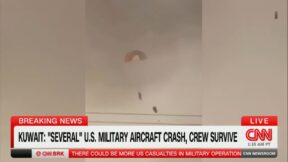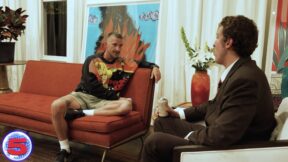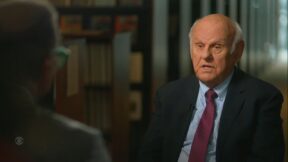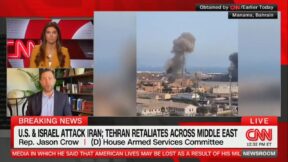Scott MacFarlane Deserves Scorn for His Pathetic Trump Shooting Sob Story
On July 13, 2024, a gunman opened fire on former and future President Donald Trump at a rally in Butler, Pennsylvania.
Trump was struck in the ear, and escaped death by only an inch or so. Corey Comperatore, a volunteer firefighter, was murdered. He left behind a wife and two children.
Some simple-minded observers might identify the tragedy of Comperatore’s death, or the implications of a very nearly successful attempt on the life of a presidential candidate, as the biggest story to come out of that day.
But lucky for us rubes, CBS News’ Scott MacFarlane is around to explain that the true tragedy had nothing to do with the loss of Comperatore, the near loss of Trump, or what it said about American political culture.
Best to let the real hero — and victim — explain it for himself, as he did on The Chuck ToddCast earlier this week:
For those of us there, it was such a horror because you saw an emerging America. And it wasn’t the shooting, Chuck. This was-, I got diagnosed with PTSD within 48 hours. I got put on trauma leave, not because, I think, of the shooting, but because you could-, you saw it in the eyes, the reaction of the people. They were coming for us! If he [Trump] didn’t jump up with his fist, they were going to come kill us!
“I know,” replied the eponymous host sympathetically.
It’s moments like these that should cause us to lament the lack of functional shame in a society desperately in need of it.
A man was lying on the ground, dying or already dead next to his wife and daughters, but MacFarlane wants to make it clear that the “horror” of the day was attributable not to the shooting, but the fantasy — and that is the right word for it — that he had concocted in his head of Trump’s supporters coming to kill him.
There are two insidious phenomena observable in MacFarlane’s retelling of that fateful day last July.
The first is his commitment to The Narrative™. MacFarlane’s view of American politics is that there are good guys and bad guys, and that every story ought to reflect well on whom he deems good and poorly on those he deems bad. That’s why he can watch a political leader and one of his supporters get shot right in front of him and just moments later think to himself, “These rabid Trump supporters are murderous.”
It’s not an uncommon affliction. Earlier this month, CNN and MSNBC failed to spend even a single second of airtime to a coordinated domestic terror attack on an ICE facility in Texas, during which one local police officer was shot in the neck.
But it is detestable.
The second is a deep and abiding self-obsession. It’s impossible to watch the clip of MacFarlane on Todd’s podcast without thinking of the closing line of Tom Wolfe’s “The Me Decade”: “And this one has the mightiest, holiest roll of all, the beat that goes … Me … Me … . Me … Me …”
Make no mistake, there are brave journalists. Clarissa Ward, Trey Yingst, and their peers show up in war zones with bullets flying above and bombs landing beside them.
In the Trump era, though, some political reporters have taken to acting as though they’re in the trenches alongside the likes of Ward and Yingst. Jim Acosta, the ex-CNN anchor, pioneered this delusional, smug self-conception. Signing off from his old network earlier this year, Acosta boasted that he was among “the defenders of the people” and held up a poster with the words, “I March For Jim Acosta and a Free Press” emblazoned on it.
A quick and much-needed reminder for all of the Don Quixotes — from MacFarlane to Acosta — who write and speak words for a living: You are not heroic, and the fact that your job is sometimes uncomfortable does not make you as much. It wasn’t comfortable when Corey Comperatore was running into burning buildings. It’s not comfortable when police officers are shot at. It’s not even comfortable when you have a disagreement with a colleague you have to work with for the next day, week, month, and year. Just because a Trump supporter has heckled or looked at you with disdain doesn’t mean you should throw yourself in front of a camera to whine about it — especially as you downplay a tragedy you bore witness to.
And if you do, perhaps you’re deserving of at least some of that scorn you resent so much.
Watch above via The Chuck ToddCast on YouTube.
This is an opinion piece. The views expressed in this article are those of just the author.
New: The Mediaite One-Sheet "Newsletter of Newsletters"
Your daily summary and analysis of what the many, many media newsletters are saying and reporting. Subscribe now!






Comments
↓ Scroll down for comments ↓